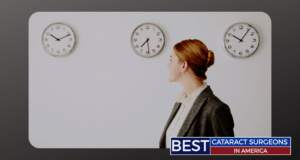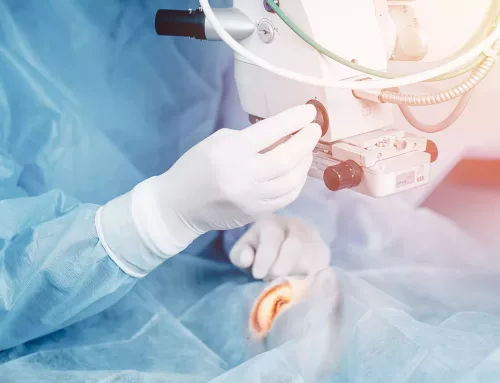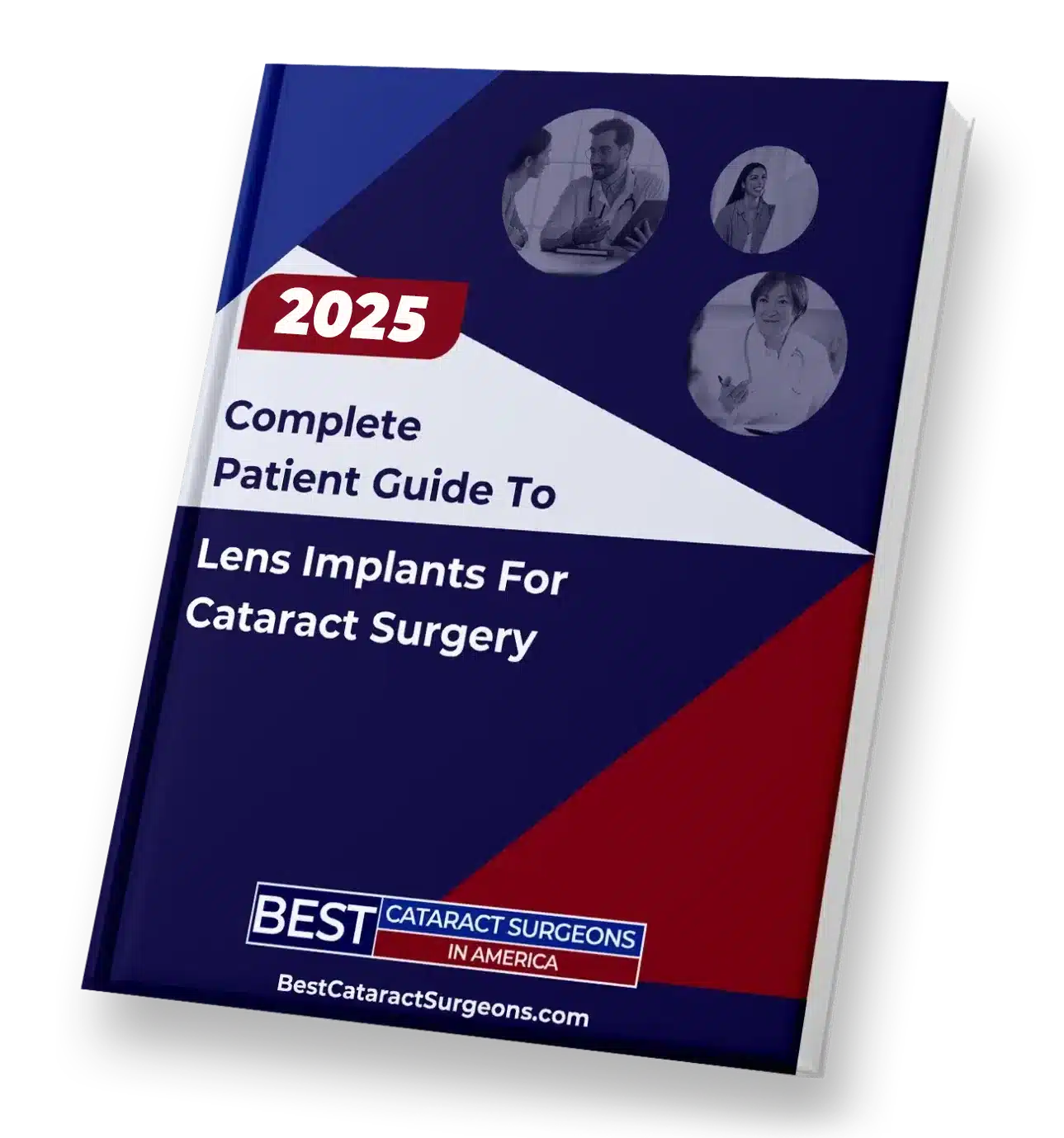It can take years for cataracts to develop, but one of the most common questions patients ask is: “How long does cataract surgery take?”
Modern cataract surgery is one of the most impactful procedures in the history of the world! Cataract surgery can be completed in under 15 minutes. Truly a miracle of our modern world.
However, while most surgeries are completed in under 15 minutes, this is not a one-size-fits-all answer.
Patients and cataracts come in all different sizes and shapes. There are many different factors that can impact how long cataract surgery takes. For example, there are different ways to have cataract surgery, such as laser-assisted cataract surgery. There are different types of lens implants. There are also different types of cataracts and ocular conditions that can result in longer surgery times.
In this article, we’ll tell you everything that you need to know about how long surgery takes in a variety of common situations.
How Long Do Different Types of Surgery Take?
There are different ways to have cataract surgery. Some types can take longer than others. Let’s review the different types of cataract surgery, and how long each takes.

How Long Does Laser Cataract Surgery Take?
For most patients with routine cataracts, laser cataract surgery takes approximately 15 minutes. The laser performs some of the delicate steps of the surgery first. After the laser does its part, such as making incisions or breaking up the cataract, the surgeon will then finish removing your cataract and implanting your new lens implant.
The laser portion of the procedure can take 2-3 minutes, and then the rest of the procedure usually takes 7-10 minutes.
How Long Does Basic or Traditional Cataract Surgery Take?
Basic or traditional cataract surgery for routine cases takes approximately 10-15 minutes. Unlike in laser cataract surgery, the steps of the surgery that the laser would perform, are performed by hand instead. This typically does not add much time to the procedure. For routine cataracts, the time it takes to perform basic cataract surgery is approximately the same as laser assisted cataract surgery.
How Long Does Extracapsular Cataract Extraction (ECCE) Take?
In most modern cataract surgeries, the cataract is broken up, and liquified using the energy from ultrasound. The process of using ultrasound to break up the cataract is called “phacoemulsification”.
In some cases, phacoemulsification is not possible, and the cataract must be removed through a larger incision. For surgeons who rarely perform this technique, it can take 30-45 minutes. In developed countries, this technique is rarely used. However, in countries that don’t have access to phacoemulsification, ECCE is the technique used to perform most surgeries. In these countries, where surgeons do hundreds, or even thousands, of this procedure every year, surgery time can be 10-15 minutes, just like with phacoemulsification.
How Long Does Intracapsular Cataract Extraction (ICCE) Take?
Intracapsular cataract surgery is another less common technique in the United States. However, in some rare circumstances, it may necessary. The cataract is wrapped in a capsule, which holds it in place throughout life. In modern cataract surgery, the capsule is opened, and the cataract is removed, leaving the capsule intact to hold the new lens implant.
If for some reason it appears unsafe to open the capsule, such as if the support structures of the lens-capsule complex, called “zonules”, are damaged, then it may be necessary to perform ICCE.
Because these are less common and more complex surgeries, they often take longer than more routine cases. Patients should expect 30-60 minutes for these procedures.
Does the Lens Implant Affect How Long Surgery Takes?
There are a variety of different lens implant options that you can choose for cataract surgery. Typically, most lenses take the same amount of time with minor differences. Because we want to bring you the most detailed information about cataract surgery on the internet, let’s discuss some of these details
Toric Lens Implants
Toric lens implants are used to correct astigmatism. They have to be positioned inside the eye to balance out the curvature of your cornea. Prior to your surgery, your surgeon will measure your astigmatism. Your surgeon will use this information during your surgery to position your lens. During the planning of your surgery, your surgeon will make a decision about how to position your lens. On your surgery day the steps involved in positioning the lens only about 1-2 minutes to your procedure.
Multifocal Lens Implants
Multifocal lens implants typically don’t add any addition time to your surgery, unless they happen to be a toric lens. Multifocal lenses come in both toric and non-toric versions. One is not better than the other. Rather, your surgeon will use the one that is best for your eye based on whether your astigmatism makes using a toric right for you.
What Other Factors Impact How Long Cataract Surgery Takes?
There are a variety of conditions that can add some time to how long surgery takes. Let’s discuss 3 of the most common reasons that your surgery may take a few minutes longer:
-
- Mature or advanced cataracts
- Small pupils
- Pseudoexfoliation
- Traumatic cataracts
Mature Or Advanced Cataracts
There are different types of cataracts, and there are several reasons that more advanced, or mature, cataracts can take longer. If a patient waits too long to have cataract surgery, the cataract becomes denser and harder to remove. Also, the risks of complications can increase. Each step of the surgical procedure can take longer and involve more care. If a complication occurs, the management of that complication also can take more time.

Example of a mature cataract
For example, a mature cataract is often very dense, and requires a significant amount of ultrasound energy to break up. This alone can take more time. During the process of trying to remove the cataract, the support structure can become damaged. If that occurs, the procedure can become prolonged.
Mature cataracts can often take up to 30 minutes to complete, and sometimes even longer.
Small pupils
While you are in the pre-operative area before your procedure, the staff will dilate your eye. The cataract is behind the iris and pupil. Having a widely dilated pupil makes cataract surgery easier, and faster.
If your pupil does not dilate well, your surgery may take longer.
There are many reasons that a pupil may not dilate well. There are certain prostate medications, such as Flomax, which can result in poor dilate. Another example of patients who dilate poorly includes some patients who have a history or inflammation in the eye, such as iritis or uveitis. In many other patients, there is no identifiable reason why they dilate poorly.
There are techniques that can be performed to stretch or expand the pupil during your procedure. These techniques are common, but can add a few minutes to the procedure. If the case is routine in all other ways aside from the small pupil, you can expect to add an additional 2-3 minutes to the procedure time.
Pseudoexfoliation
Pseudoexfoliation is a syndrome which can cause the support structures of the cataract and your new lens implant to weaken. The extent of the damage to these structures, called “zonules”, is often not apparent until the time of your surgery during the normal movements and manipulations inside the eye.
If the zonules are damaged it can sometimes make the removal of the cataract or the placement of a new lens implant more challenging, adding additional time to your cataract surgery.
Traumatic Cataracts
In patients who have had trauma there can be damage to the support structures of the cataract which are located behind the iris. Even with a dilated eye exam, the extent of this damage can often not be appreciated until the time of surgery. Sometimes during the normal steps of the procedure, if the support structure is not strong enough to support the original lens, or the new lens implant, it can add significant time to the duration of surgery.
For example, if the support structure is determined to not be stable enough to support the typical location for the new lens implant, it may require other techniques to implant the lens. It is also possible that the implantation of the new lens requires an additional surgery.
In most cataract procedures, the cataract is removed, and a new lens implant is placed. If either of these can not be accomplished, an additional surgery may be necessary. It is important to let your surgeon know if you have a history of trauma or injury to your eye prior to surgery so he or she can prepare accordingly.
How Long Does Cataract Surgery Last?
Cataract surgery should last a lifetime. Once your cataract is successfully removed, it never grows back. There is something called a “secondary cataract“, but it is not the same as the original cataract. It does not require surgery. Rather it is treated with a simply painless laser procedure in the office.
If you have a lens implant placed, as nearly all patients do, that lens should last the rest of your life. In rare cases of trauma or pseudoexfoliation, sometimes the lens can move or become unstable. However, these situations are quite uncommon .
How Long Does Recovery from Surgery Take?
In routine cases, recovery can be quite fast. However, like so many topics in cataract surgery, there is no one answer that universally applies to everyone. While many patients have improved vision in a day or two, some patients are slow healers and may take longer. Browse our other articles for information about your recovery time, such as how long after cataract surgery you can drive, read, swim, or work.
Summary
For most patients, their cataract surgery will take between 10-15 minutes. Some will take 20-30, and very few will take longer than that. Discuss with your doctor if you have any reasons that your surgery may be longer so that you can accurately set your expectations before surgery.
For more information on cataract surgery, visit our educational resources here.
You can also browse our site to find a a doctor who performs “cataract surgery near me“.











